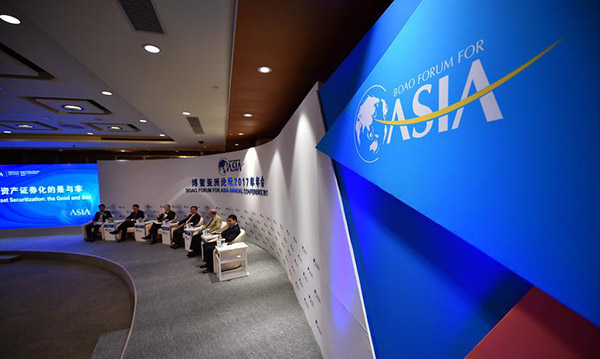China champions economic globalization, braves challenges

Delegates speak at the Boao Forum for Asia in Hainan Province on March 24, 2017. (Photo/Xinhua)
Economic globalization, not isolation, will ensure a better future for Asia and the world, according to the ongoing Boao Forum for Asia (BFA) in Hainan Province.
The theme of the conference - "Globalization and Free Trade: The Asian Perspectives" - reflects the attention to economic globalization paid by the international community, especially Asian countries, said Chinese President Xi Jinping in a congratulatory letter to the conference's opening session on Saturday.
Xi called upon attendees at the conference to pool their wisdom on solving the major problems facing the world and regional economy, and push forward a more dynamic, inclusive and sustainable economic globalization process.
The conference, which concludes on March 26, chimes with China's stance and efforts on globalization despite increasing anti-globalization sentiment.
In his January speech during the World Economic Forum at Davos, Xi said protectionism is like "locking oneself in a dark room."
In a speech at the opening ceremony at Boao, Chinese Vice Premier Zhang Gaoli asked Asian countries to promote economic globalization and free trade, and forge a community of common destiny for Asia and mankind.
To achieve that goal, Asia needs peace, innovation, openness, sharing and fairness, said Zhang.
GLOBALIZATION WINS GLOBAL OVATION
China's confidence resonates with international community.
Leslie Maasdorp, vice president and CFO of the New Development Bank, said the world is in the midst of a transition where questions are being raised about the downside of globalization.
Maasdorp said that Xi's letter and the address from the vice premier cemented the view that China sees globalization as a positive force for the world and will defend free trade.
"We are pleased to hear some of the key words such as openness and inclusiveness that China is reaffirming to support the next phase development of globalization," said Peder Holk Nielsen, CEO of Denmark-based biotech firm Novozymes.
"Innovation is regarded as a prominent impetus to global economic vitality through new technologies and new development models," Nielsen said.
Elaborating on innovation, Zhang Gaoli called for economic structural reform, utilization of new technology and development of a new economy.
David Morris, chief representative of the Pacific Islands Forum, said, "The Pacific Islands region has vast resources but is remote from major economies, so we look forward to more open markets, better connectivity and international cooperation to support sustainable development."
In his speech, Zhang reaffirmed China's commitment to further opening up its market, saying that the country is expected to import goods worth US$8 trillion in the next five years.
During the period, China will attract US$600 billion of foreign investment, with outbound investment reaching US$750 billion, he said.
BELT AND ROAD: THE WAY FORWARD
The Belt and Road Initiative, proposed by China in 2013 with the aim of building a trade and infrastructure network connecting Asia with Europe and Africa, is part of the Chinese answer to globalization.
The initiative, which has seen the participation of more than 100 countries and international organizations, has helped stimulate economic growth, create jobs, and improve quality of life, said the vice premier.
The scheme has promoted economic and trade cooperation and offered a new way to curb the anti-globalization trend, according to BFA's annual report on the development of emerging economies.
Hans-Paul Burkner, chairman of the Boston Consulting Group, said, "The Belt and Road Initiative is very important to connecting countries and creating more opportunities for exchanges of goods and services."
Burkner believes the initiative can push globalization to a new level, as it can connect more countries in Asia and beyond to the world economy.
Vice president of Asian Development Bank Stephen Groff said, "It is an ambitious plan for the region as a whole, and we are strong supporters for the notion of regional cooperation and integration."
Future strong growth for Asia is dependent on the ability of Asian economies to further integrate, Groff said.
Former Prime Minister of Pakistan Shaukat Aziz said the initiative strengthens the links between Pakistan and China.
"We have started working on several projects, and more would happen," he said. "Once you improve connectivity, you create interdependence, which puts friendship and relationships on a solid footing."
"The initiative will carry much of the hopes of a new round of globalization," said Chi Fulin, head of the China Institute for Reform and Development.
NO MORE LOSING OUT
The BFA also addresses the challenges of economic globalization, including the feared gap between winners and losers.
Prime Minister of Nepal Pushpa Kamal Dahal said that there has been a critical asymmetry in sharing the benefits of globalization, which has led to apprehensions in various parts of the world.
Zhou Wenzhong, BFA's secretary general, said though globalization has driven the world economy and poverty alleviation over the past decades, it has also accentuated the imbalance between growth and distribution, capital and labor, efficiency and fairness.
How a country accommodates people and industries which are on the losing end of globalization determines its integration with others, said Yao Zhizhong, deputy director of the Institute of World Economics and Politics at the Chinese Academy of Social Sciences.
Generally speaking, globalization is beneficial to emerging economies, and its progress hinges on the management of negative effects, he said.
There are no losers in globalization, said Jin Liqun, president of the Asian Infrastructure Investment Bank.
"Blaming globalization works in nobody's interests," Jin said. Although the extent of benefits may vary, an open dialogue can enhance mutual understanding.
Globalization is a natural process but countries have to improve domestic policies, Jin said.

